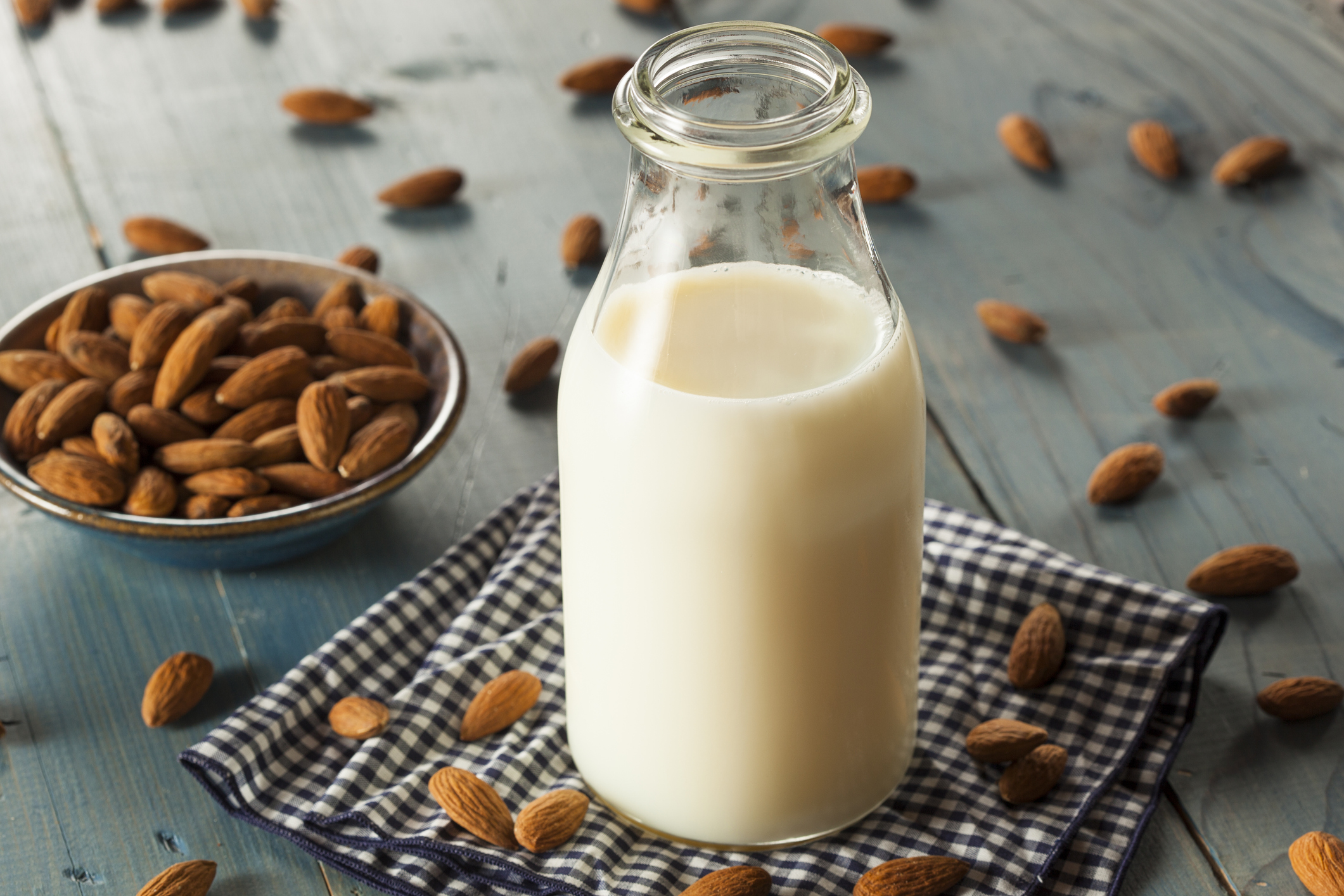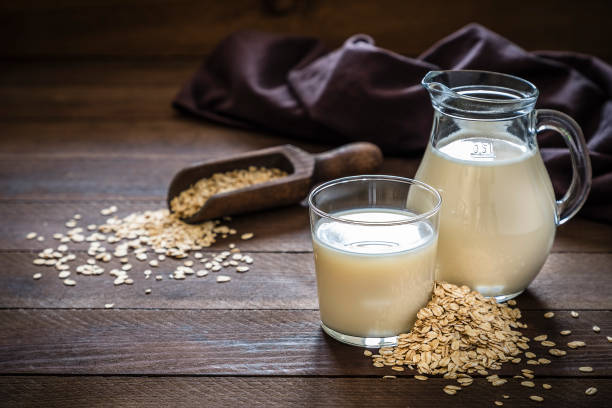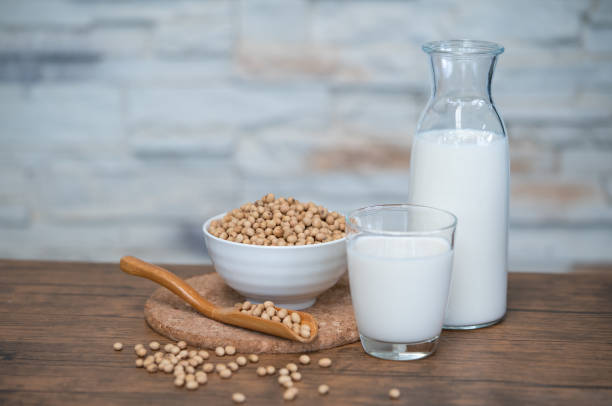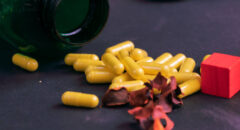Today, your milk mustache may not come from drinking a glass of dairy milk. There are so many milk options readily available at your supermarket and just as many homemade milk recipes online. With all of the debate over whether drinking milk, from animals or plants, is good for your health, people want and need to know the truth.
Here we've gathered more information on four different types of milk (almond, oat, soy, and dairy) so you can compare and make the choice based on what's best for you and your loved ones.
Almond Milk

Almond milk has gained a lot of popularity for several healthy reasons. It is dairy-free, which is appealing to anyone who is lactose intolerant or vegan.
Almond milk is lower in calories than dairy milk and has no cholesterol so it’s often included in weight-loss diets. Almond milk has a mild nutty flavor so, it’s a great option to add to your morning shake, smoothie, or cup of coffee.
What’s In It?
To make almond milk, almonds are ground up and soaked in water. The mixture is filtered and the liquid that remains is almond milk. To make almond milk more nutritious, manufacturers fortify almond milk with calcium, vitamin D, and other nutrients.
Sugar is also added to many varieties of almond milk. So, if you’re aiming for lower calories, unsweetened almond milk or homemade almond milk are your best options.
Almond milk is not just limited to the carton. There are a variety of almond milk products available like yogurt, coffee creamers, ice cream, and whipped cream.
Oat Milk

If you have a nut allergy, are vegan or lactose intolerant, or just hate the taste of other milks, oat milk is a great alternative. Oat milk has a creamy texture that is similar to two percent dairy milk. This characteristic makes oat milk a great substitute for recipes that traditionally use dairy milk or for a dairy milk drinker who wants to try something new.
What’s In It?
Much like almond milk, oat milk is produced when oats are soaked in water and the mixture is filtered. Nutritionally, oat milk has more calories than almond milk so, it may not be optimal for meeting weight loss goals. However, oat milk offers more fiber and fewer grams of fat than almond milk. Store-bought oat milk is fortified with extra nutrients and many brands are found to have more Vitamin D than milk per serving.
Soy Milk

Soy milk has been on the market for many years as an alternative to dairy milk. Soy milk has a creamy texture and is a great option for vegans or those with lactose or nut allergies. Soy milk is slowly making a comeback after receiving backlash for its potential effects on the hormone estrogen.
What’s In It?
Soy milk is made from soaking ground soybeans. It is high in protein and fiber when compared to other milks. It contains no cholesterol and is low in saturated fat. Store-bought soy milk is fortified with Vitamin D, calcium, and other nutrients the body needs.
Soy milk contains isoflavones, which are chemically similar to estrogen. For this reason, many have been on the fence about consuming soy milk. Many studies have been conducted to research the effects of isoflavones on estrogen levels, cancers, and female and male reproductive health.
Dairy Milk

Dairy milk has been a part of American diets for ages. It is what doctors have recommended for infants after age 1 to promote strong healthy bones and good health. Today, many people are coming to realize their body has difficulty processing dairy milk and have sought other alternatives.
What’s in it?
You’ve probably known that dairy milk comes from dairy cows for most of your life. The cow produces milk that is extracted from its mammary glands, either manually or by machinery. Then, manufacturers take the milk through a process called pasteurization to eliminate bacteria.
Dairy milk is fortified with Vitamin D. Federal law requires that manufacturers fortify reduced and low-fat dairy milk with Vitamin D. Whole milk contains Vitamin D, but many manufacturers still decide to fortify it. Dairy milk can be found in cheese, yogurt, ice cream, creamers, soups, baked goods and enjoyed in smoothies, shakes, and on breakfast cereals.
Whether you decide to go with animal or plant-based milk, be sure to read the nutritional label to determine which option is best for you. Once you decide, grab your favorite glass and drink up because milk does a body good!
 Dr. Candace McMillon-Dantley is the health-empowering creator of The Doc Knows and she’s on a mission to motivate you to a life of health. She has a Doctorate in Chiropractic Medicine and a Bachelor of Science in Biomedical Sciences. When she’s not health writing, she is health motivating and educating during her interactive presentations on healthy nutrition, self-care and conditions of the body. Her experiences as a business owner, chiropractor, wife and mom of two resonate and relate with her audiences. Connect with Dr. Candace on Instagram @drcandace.
Dr. Candace McMillon-Dantley is the health-empowering creator of The Doc Knows and she’s on a mission to motivate you to a life of health. She has a Doctorate in Chiropractic Medicine and a Bachelor of Science in Biomedical Sciences. When she’s not health writing, she is health motivating and educating during her interactive presentations on healthy nutrition, self-care and conditions of the body. Her experiences as a business owner, chiropractor, wife and mom of two resonate and relate with her audiences. Connect with Dr. Candace on Instagram @drcandace.









